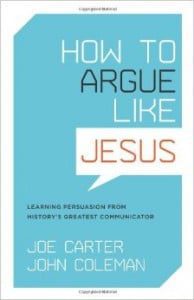⏱️ Estimated Reading Time: 4 min read
 We all communicate each and every day in one form or another. Since we are commanded in Scripture to always be prepared to give an account for the reason we believe, it behooves us to be capable communicators when sharing the hope that is within us, namely the message of the gospel. What better place to study the art of gospel communication that from the words of Jesus. Joe Carter and John Coleman in their helpful book How to Argue Like Jesus: Learning Persuasion from History’s Greatest Communicator, take a look at various methods of communication, reflecting on how Jesus utilized those methods as evidenced in Scripture.
We all communicate each and every day in one form or another. Since we are commanded in Scripture to always be prepared to give an account for the reason we believe, it behooves us to be capable communicators when sharing the hope that is within us, namely the message of the gospel. What better place to study the art of gospel communication that from the words of Jesus. Joe Carter and John Coleman in their helpful book How to Argue Like Jesus: Learning Persuasion from History’s Greatest Communicator, take a look at various methods of communication, reflecting on how Jesus utilized those methods as evidenced in Scripture.
There is much to enjoy about this book and the approach taken by the authors. The reader will have to engage a number of concepts and words that could be rather foreign to them initially; however, the authors do a great job of explaining the concepts, including examples of what the various elements of communication look like in practice, as well as how they are used in Scripture.
One thing that is quite noticeable is the authors engage Greek ways of argumentation throughout this book. While it is certainly true that Jesus would have been familiar with the Greek approach to argumentation as evidenced in the Gospel accounts, Jesus also spoke and discussed points using many Jewish and Hebraic ways of thinking, an approach that is at times a bit different than how the Greeks would have reasoned through a concept. Given his audience was mainly Jews and while that audience would have been familiar with Greek methodologies of thinking, it would have been good for the authors to engage a bit more with the Hebraic/Jewish way of reasoning, if anything as a point of comparison with Greek thought and to also engage those portions of the Gospels where such an approach occurs.
The ability to identify for example syllogisms or logical statements within Scripture is something quite important. Since Scripture is logical in how it presents it overall message, following the points God is making in His Word in order to get to the underlying point, as well as understanding what that underlying point is all about is one of the fundamental elements of sound exegesis. Carter and Coleman do a great job of explaining what can be some very difficult philosophical and communication concepts. I also appreciated the repeated caution provided by the authors concerning the use of the various concepts they present. The misuse for example of the reduction ad absurdum can as the authors correctly note can lead to “unreasonable logical jumps, many of which involve so-called psychological continuums” that are highly unlikely.” If we are using Jesus’ words as an example of how to communicate, one must notice how he used these techniques, how far he took them, and why he employed them.
One particularly helpful aspect of this book are the case studies included in the final chapter. Case studies are typically helpful as they provide the means to put what one has learned into practice. The authors have selected studies that identify the methodologies they have discussed throughout the book in real life situations. After reading these case studies, the reader will be better prepared to identify the methods of argumentation that Carter and Coleman have presented. Additionally, if the reader takes the time to answer the questions the authors pose at the conclusion of each case study, they will be even more prepared to identify, employ, and correctly utilize for example, pathos, logos, ethos, or the plethora of other techniques discussed in this book as they share the message of the gospel or when they engage others in meaningful conversation, especially conversations related to matters of Scripture.
This is a book I highly recommend for all believers. Since we should all be actively engaging those around us with the message of the gospel and the truth of Scripture, understanding and utilizing the methods Jesus Himself used is most certainly a good practice to find yourself involved in. While the title of this book is how to argue like Jesus, perhaps a better title is how to communicate effectively the truth of Scripture for that is the intent and the message the authors aptly get across to the reader.
This book is available for purchase from Crossway Books by clicking here.
I received this book for free from Crossway Books for this review. I was not required to write a positive review. The opinions I have expressed are my own. I am disclosing this in accordance with the Federal Trade Commission’s 16 CFR, Part 255 : “Guides Concerning the Use of Endorsements and Testimonials in Advertising.”



